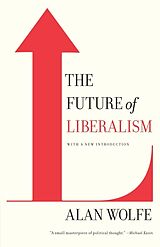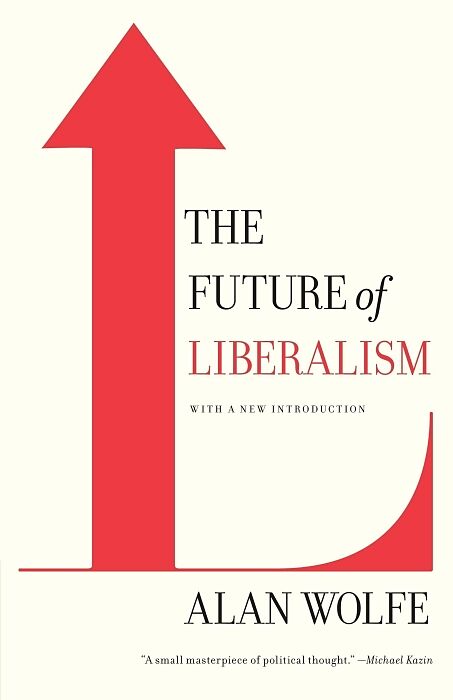The Future of Liberalism
Einband:
Kartonierter Einband
EAN:
9780307386250
Untertitel:
Englisch
Genre:
Philosophie & Religion
Autor:
Alan Wolfe
Herausgeber:
VINTAGE BOOKS
Anzahl Seiten:
368
Erscheinungsdatum:
09.02.2010
ISBN:
978-0-307-38625-0
Zusatztext 77470807 Informationen zum Autor Alan Wolfe is a professor of political science and director of the Boisi Center for Religion and American Public Life at Boston College. A contributing editor of The New Republic, The Wilson Quarterly, CommonWealth, and In Character, Professor Wolfe also frequently writes for Commonweal, The New York Times, Harper's, The Atlantic Monthly, and The Washington Post. He lives in Brookline, Massachusetts. Klappentext A compelling and deeply felt exploration and defense of liberalism: what it actually is, why it is relevant today, and how it can help our society chart a forward course. The Future of Liberalism represents the culmination of four decades of thinking and writing about contemporary politics by Alan Wolfe, one of America's leading scholars, hailed by one critic as "one of liberalism's last and most loyal sons." Wolfe mines the bedrock of the liberal tradition, explaining how Immanuel Kant, John Stuart Mill, John Dewey, and other celebrated minds helped shape liberalism's central philosophy. Wolfe also examines those who have challenged liberalism since its inception, from Jean-Jacques Rousseau to modern conservatives, religious fundamentalists, and evolutionary theorists such as Richard Dawkins. Drawing on both the inspiration and insights of seminal works such as John Locke's Second Treatise on Government, Adam Smith's Theory of Moral Sentiments, Kant's essay "What is Enlightenment?," and Mill's On Liberty and The Subjection of Women, Wolfe ambitiously sets out to define what it truly means to be a liberal. He analyzes and applauds liberalism's capacious conception of human nature, belief that people outweigh ideology, passion for social justice, faith in reason and intellectual openness, and respect for individualism. And we see how the liberal tradition can influence and illuminate contemporary debates on immigration, abortion, executive power, religious freedom, and free speech. But Wolfe also makes it clear that before liberalism can be successfully applied to today's problems, it needs to be recovered, understood, and embraced-not just by Americans but by all modern people-as the most beneficial way to live in our complex modern world. The Future of Liberalism is a crucial, enlightening, and immensely rewarding step in that direction.Chapter 1 The Most Appropriate Political Philosophy for Our Times At the Ending In the beginning, wrote John Locke in his Second Treatise on Government , all the world was America. Locke, the late-seventeenth-century English philosopher as well known for his explanation of how our ideas are formed as for his insistence that government be based on the consent of the governed, viewed America, at least before the white man arrived, as a land in which, because no such thing as money was any where known, conflicts over that particular root of all evil would not be necessary. From that seemingly simple idea sprung a political philosophy thoroughly alien to the absolutist monarchies of Europe. Because everyone possesses the capacity to work, all have a right to the property created when their labor is mixed with the blessings offered by the land. It follows that societies are best organized by freedom (no one can legitimately take away what naturally belongs to you), as well as equality (nor can they take it away from anyone else). To say that in the beginning all the world was America is to claim that freedom and equality would become forces too powerful to resist. That, in turn, became the single most influential component of liberalism: the dominant, if not always appreciated, political philosophy of modern times. Three centuries after Locke wrote his masterpiece, liberalism offers the best guide not only to our own times, but to the future as well. It will be my task in this book to show why. Liberalism is...
ldquo;Alan Wolfe has written a small masterpiece of political thought: deeply learned, pragmatic and principled, appropriately self-critical, and a pleasure to read. It is an essential book for anyone who hopes liberalism will prosper again or wonders why it should.” —Michael Kazin, author of A Godly Hero: The Life of William Jennings Bryan
“Alan Wolfe restores luster to the original ideals of liberty and equality, but also shows liberalism’s pragmatic side–its recognition of the need for governance at home and leadership abroad. He shows that liberals, too, can have a ‘purpose driven life’ if they just reclaim their legacy.” —Mark Lilla, author of The Stillborn God: Religion, Politics, and the Modern West
“In this wise, passionate, and persuasive book, Alan Wolfe draws on decades of reflection and scholarship to elucidate and champion one of the most important concepts of the human enterprise. While fully living up to its title by providing hope and guidance for the century just begun, The Future of Liberalism is also a tour de force of intellectual history–and an astute commentary on the great political issues of our time.” —Strobe Talbott, author of The Great Experiment
“This book requires your attention. Liberalism in America cannot be dead. It is at the center of its history. But Americans should know why. Alan Wolfe tells us in a book of impressive scholarship and wide reach.” —Jeff Madrick, author of The Case for Big Government
“Alan Wolfe and I disagree on many things, but as a defender and thinker about the liberal philosophy in America, he is one of the best. The Future of Liberalism is typical of that. I continue to learn from Alan when I read him, and so doing helps me define and refine my positions and thinking. Alan is always worth the read.” —William J. Bennett, author of America: The Last Best Hope
“For all the fountains of ink and miles of bandwidth expended in trying to make sense of Barack Obama’s politics, the soundest explanation I’ve come across is contained in The Future of Liberalism, a book that mentions the president-elect just once, in passing. . . . The liberalism that Wolfe explains and Obama exemplifies is a politics of hope and faith. . . . As befits the kind of intellectualism he sees as a defining virtue of liberalism, Wolfe’s arguments are nuanced and twisty . . . This book is the best guide I know to sussing out what Obama’s liberalism means.” —Bob Moser, The Texas Observer
“Many university professors write lethally boring books with ambitious titles, but Wolfe is not one of them. His prose never bogs down his examples and his analogies ring true and sometimes he pens a sentence that makes you put the book down and wish you had written it yourself. . . . Wolfe’s takedown . . . is so exact, and so necessary, it should be mandatory reading for all who care about the meaning of the word freedom . . . Read this book. Dog-ear it. Keep it close at hand. Like its author, it is a treasure trove of intelligence, decency and wisdom.” —Michael Sean Winters, America
“Welcome and readable. . . . [A] fine defence of liberal values.” —The Economist
“Wolfe provides in The Future of Liberalism, his 20th and most important book, a learned and lucid examination of the traditions and the trajectory of the dominant political philosophy of modern times. . . . His analysis is always forceful and formidable. . . . The future of liberalism ought to be bright, Wolfe concludes, passionately and persuasively.” —Glenn C. Altschuler, Boston Sunday Globe
“[Alan Wolfe] is strongest in showing the clash and bang of ideas in contest with one another. Most interesting, he demonstrates how conflicts ideas can be at once advantageous and antagonistic to the liberalism he advocate…

Leider konnten wir für diesen Artikel keine Preise ermitteln ...
billigbuch.ch sucht jetzt für Sie die besten Angebote ...
Die aktuellen Verkaufspreise von 6 Onlineshops werden in Realtime abgefragt.
Sie können das gewünschte Produkt anschliessend direkt beim Anbieter Ihrer Wahl bestellen.
Loading...
Die aktuellen Verkaufspreise von 6 Onlineshops werden in Realtime abgefragt.
Sie können das gewünschte Produkt anschliessend direkt beim Anbieter Ihrer Wahl bestellen.
| # | Onlineshop | Preis CHF | Versand CHF | Total CHF | ||
|---|---|---|---|---|---|---|
| 1 | Seller | 0.00 | 0.00 | 0.00 |
